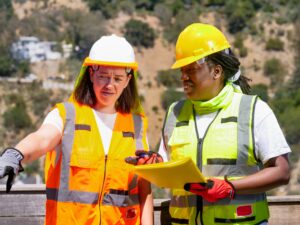The construction industry is evolving rapidly, with technological advancements offering new opportunities for streamlining processes and boosting efficiency. However, implementing new technology can be a daunting task for construction managers. In this blog post, we will explore 5 essential steps that construction managers can take to successfully introduce new technology to their crew and improve project outcomes.

I. Technology Integration
Recognize the benefits of Implementing New Technology
Recognizing the benefits of implementing new technology is the first step for construction managers. This involves understanding how technological advancements can enhance efficiency, productivity, and overall project success. By acknowledging these advantages, managers can be more open to adopting innovative tools and strategies within their crews, fostering a culture of progress and adaptation.
Identify common challenges faced by Construction Managers
Construction managers commonly face challenges such as regulatory complexities, tight schedules and budgets, team coordination, safety risks, and quality control. They must also contend with weather, material shortages, unexpected site conditions, and communication gaps. Overcoming these hurdles demands proactive planning, effective leadership, and the right technology and resources.

Set clear objectives
Setting clear objectives is essential for construction managers to establish a roadmap for their projects. By defining specific, measurable, achievable, relevant, and time-bound (SMART) goals, managers can provide clear direction to their teams, align everyone’s efforts, and track progress effectively. Clear objectives help in managing resources efficiently, identifying potential obstacles early, and ensuring that the project stays on course towards successful completion. Additionally, they facilitate communication among stakeholders and foster accountability, ultimately leading to improved project outcomes and client satisfaction.
In the fast-paced world of construction, embracing new technology is essential for staying competitive and improving efficiency. However, the implementation process can be daunting for construction managers. By following these steps, construction managers can successfully integrate new technology into their crew’s workflow.
II. Choose the Right Technology Solutions
Assess the needs and requirements of Your construction projects
Assessing construction project needs involves analyzing scope, client expectations, budget, regulations, environment, and resources. This understanding guides tailored strategies, risk identification, skill requirements, and technology selection. Through this assessment, managers proactively address challenges, optimize delivery, and ensure project success.
Research and evaluate available technology options
Researching and evaluating available technology options is essential for construction managers. It involves identifying tools and equipment that streamline processes and enhance project outcomes. This assessment ensures informed decisions aligned with project goals and budget constraints, keeping teams competitive in the industry.
Collaborate with crew members to select the most suitable solutions
Collaborating with crew members to select suitable solutions is vital for construction managers. By involving the team in decision-making, managers leverage diverse perspectives and expertise to identify the most effective tools and methods. This collaborative approach fosters buy-in, enhances team morale, and increases the likelihood of successful implementation. Moreover, it ensures that the chosen solutions align with the specific needs and challenges of the project, maximizing efficiency and productivity on site.

Selecting the right technology solutions tailored to your construction projects is crucial for successful implementation. By involving your crew in the decision-making process, you ensure that the chosen technology aligns with their needs and enhances overall productivity.
III. Training and Support for Technology Implementation
Develop training programs tailored to your crew’s skill levels
Developing customized training programs is crucial for construction managers to improve crew performance. Assessing skill levels enables tailored initiatives covering technical and soft skills. These programs enhance competency, morale, and productivity, ensuring crews remain adaptable in the evolving construction landscape.
Offer ongoing support and resources for troubleshooting
This ensures quick resolution of issues, minimizes disruptions, and maintains productivity. It also fosters a positive work environment and promotes team cohesion.
Encourage a culture of continuous learning and improvement
Encourage continuous learning and improvement within the construction team. This fosters growth, innovation, and adaptability, leading to enhanced performance and project success.

Investing in proper training and support for your crew is key to ensuring a smooth transition to new technology. By fostering a culture of continuous learning, you empower your team to adapt to changes and maximize the benefits of the new technology.
IV. Implement Technology Gradually and Strategically
Plan phased rollouts to minimize disruption
Plan phased rollouts to minimize disruption during the implementation of new technologies or processes. This method allows for a gradual transition, ensuring teams can adapt smoothly while minimizing any interruptions to workflow or productivity.
Pilot new technology on small-scale projects
Pilot new technology on small-scale projects initially. This allows for testing and refinement before broader implementation, minimizing risks and maximizing the chances of successful integration.
Solicit feedback and make adjustments
This ensures that the technology meets the specific needs and challenges of the project, enhancing its effectiveness and acceptance among the team.

Instead of implementing new technology all at once, consider a gradual and strategic approach. Start with small-scale projects to test the technology and gather feedback from your crew. Making adjustments based on their input will lead to a more seamless integration process.
V. Monitor and Evaluate the Impact of Technology Adoption
Establish key performance indicators to track progress
These measurable metrics provide insights into the effectiveness of the new technology or processes, enabling informed decision-making and continuous improvement.
Analyze data to measure the effectiveness of new technology
This involves evaluating key performance indicators to assess its impact on productivity, efficiency, and project outcomes.
Iterate and Improve processes based on performance metrics
This continuous cycle of analysis and refinement ensures that the technology evolves to meet project needs and optimize outcomes effectively.

Monitoring and evaluating the impact of technology adoption is essential for continuous improvement. By setting clear KPIs and analyzing data, construction managers can identify areas for enhancement and refine processes to maximize the benefits of new technology.
By following these steps, construction managers can navigate the challenges of implementing new technology and lead their crew towards a more efficient and innovative future in the construction industry.
Conclusion
In conclusion, by meticulously implementing these five crucial steps, construction managers can seamlessly integrate new technology into their crews, thereby fostering an environment conducive to enhanced efficiency, productivity, and ultimately, success in their projects. Through comprehensive training programs and ongoing support, they can ensure that their teams not only embrace but also master the latest tools and systems, leveraging them to streamline processes and optimize resource utilization. By fostering a culture of innovation and adaptability, construction managers can empower their crews to confidently embrace technological advancements, enabling them to stay ahead of the curve in an ever-evolving industry landscape. With a keen focus on collaboration and communication, they can harness the full potential of technology to drive continuous improvement and achieve project milestones with greater precision and speed, ultimately delivering exceptional results that exceed client expectations.




